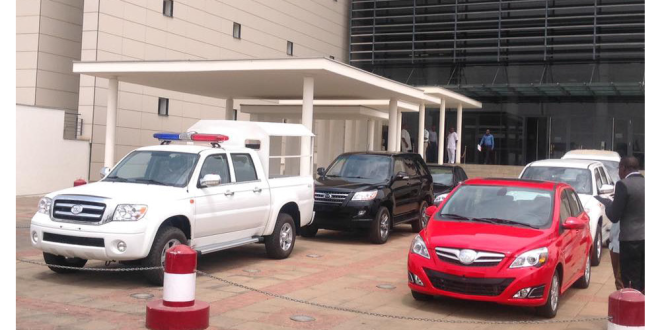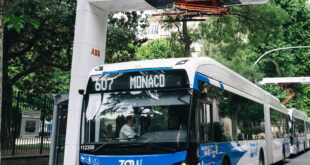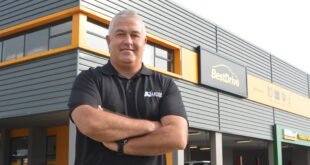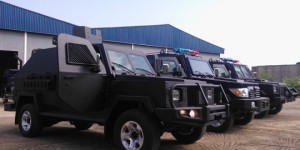
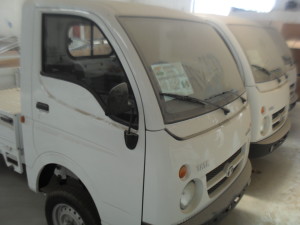
(By Moses Akaigwe) For the first time since its inauguration on May 29, 2015, the government of President Muhammadu Buhari has confirmed that it does not plan to reverse the National Automotive Industry Development Plan (NAIDP) flagged off by its predecessor in July, 2014.
This has considerably deflated the air of uncertainty that had surrounded the initiative popularly called the automotive policy in the past one year.
The assurance from government came last week through the Minister of Industry, Trade and Investment, Dr. Okechukwu Enelamah, at a forum hosted by his ministry in partnership with the National Automotive Design and Development Council (NADDC) and the Nigerian Economic Summit Group (NESG) in Victoria Island, Lagos.
At the Stakeholder Forum on the Nigerian Automotive: Setting an Implementation Agenda for National Automotive Industry Development Plan (NAIDP), Dr. Enelamah said government had identified “the auto industry as a strategic driver of industrialisation”.
Enelamah woos stakeholders on implementation
The Industry Minister explained that he was at the forum to feel the pulse of the industry, imploring the investors to embrace the initiative as theirs and contribute towards its successful implementation. He listed the expected benefits of a vibrant auto industry as employment generation, skills/technology acquisition, and foreign exchange earning/savings, among others.
The minister described the auto sector as, a “key component of the Nigeria Industrial Revolution Plan (NIRP), aimed at diversifying the economy, and increasing the manufacturing sector’s contribution to GDP”, arguing therefore, that Nigeria could not afford not to nurture a successful policy for the sector which is a vital component of the economy.
Enalemah, whose presentation was entitled, NAIDP: Setting A Strategic Implementation Framework, reminded the guests of the need for complete buy-in by all stakeholders. He further remarked: “Accept where you are now, where you want to be in future and how you are going to get there. Where you are now accommodates all the mistakes of the past; all the regrets of the past. You can actually forget the things that are behind and press ahead.”
Auto makers task government on implementation
However, as expected, the stakeholders, most of whom have invested heavily in auto production and are worried that the policy had been gliding without motivation, tasked government to ensure a more effective implementation and give support to the investors by providing them with necessary incentives.
The demands which the auto makers and the representatives of related umbrella associations took turns to articulate, included the provision of legal backing for NAIDP, prohibition of the importation of all vehicles through the land borders, improvement on critical infrastructure, ban or higher duties on the importation of used vehicles, and the introduction of credit purchase scheme.
None of the stakeholders opposed the NAIDP, but rather listed the challenges being encountered and suggestions towards effective implementation. Some of the speakers included the Chairman of NAMA (Nigerian Automotive Manufacturers Association), Mr. Tokunbo Aromolaran; the President of the Coscharis Group, Dr. Cosmas Maduka; and the Chairman of Toyota Nigeria, Chief Michael Ade-Ojo.
The Managing Director of PAN Nigeria, Mr. Ibrahim Boyi; Chairman of the auto sector in the Manufacturers Association of Nigeria (MAN); Dr. D.V.C. Obi; the Managing Director of CFAO Automotive Equipment and Services, Mr. Thomas Pelletier; Managing Director of Proforce Limited, Mr. Ade Ogundeyin; and Managing Director of Toyota Nigeria, Mr. Kunle Ade Ojo, also engaged the minister.
The stakeholders explained that a ban or stricter policy on tokunbo vehicles, importation of vehicles only through the official ports and the introduction of a vehicle finance/ownership scheme supported by government, would help achieve high volume of production and make affordable the prices of locally made automobiles, in addition to impacting on the effort to raise the level of local content.
An indication of how frustrated some of the investors felt came through Dr. Maduka’s embittered remarks when he stirred the forum by pledging support for the policy, but at the same time, berating government for inaction on implementation. “It is like government told us to carry salt and at the same time asked rain to beat us”, he said proverbially.
But, the minister in his remarks disclosed that NAIDP, formulated to facilitate an orderly development of the auto sector, was a key component of the Nigeria Industrial Revolution Plan (NIRP) designed by government to drive the efforts aimed at diversifying the economy. He, however, bemoaned the several implementation challenges the policy had suffered, including “lack of complete buy-in by all stakeholders and difficult macro-economic conditions”.
Dr. Enelemah assured that the engagement with the stakeholders, including the original equipment manufacturers (OEMs), enforcement of tariff as contained in the policy, securing the land borders to curtail smuggling, linking the National Automobile Repository Portal (NARP) with the Nigerian Customs Service portal and the planned launch of vehicle-finance/ownership scheme, are parts of government’s plan to invigorate the policy implementation
NADDC D-G’s update
In his presentation, the Director-General of the National Automotive Design and Development Council (NADDC), Engr Aminu Jalal, explained the policy provision on SKD and CKD production: “The plan objective is to have vehicle assembly operations with increasing local content incorporation. This may be achieved in assembly stages. The transition from one stage to another should not exceed 12 months (that is, a maximum of 36 months from start of SKD 2 to CKD operations (including 12 months set-up period)”
Jalal disclosed that nearly 200 hectares of land have been acquired in both Oshogbo and Kaduna for automotive industry supplier parks, stating that efforts were being made to do same in Nnewi.
Apart from new generation auto plants like Innoson Vehicle Manufacturing Company Ltd, Nnewi, and Iron Products Industries, IPI (body builder and assembler of Tata and Howo Sinotruk), in Lagos, it was learnt at the forum that since the approval of the policy in October 2013, about 14 existing assembly plants and body builders previously on the verge of closure, have bounced back (most of them with new technical partners and product line-ups).
Notable among them are VON Automobile, Lagos; PAN Nigeria, Kaduna; ANAMMCO, Enugu (in partnership with Chinese Shacman and Nigeria’s Transit Support Services, TSS); and Leyland-Busan. As at the last count, some of the brands of vehicles currently being produced in Nigeria are: For cars and SUVs, Peugeot, Kia, Nissan, Volkswagen, Hyundai, Innoson, Changan and Honda; for light commercial vehicles, Innoson, Nissan, Ford, Mitsubishi, Foton Daimler Auman and GM; for trucks, Shacman, FAW, Innoson, Sino, Forland, and MAN; and for buses, Innoson, Ashok-Leyland, Toyota (Hiace) and FAW.
The forum applauded when Mr. Ogundeyin announced that his company, Proforce Limited, was nearing 70 percent local content in the sundry armoured vehicles it produces at its plant in Ode-Remo, Ogun State.
The NAC D-G informed the forum that the annual installed capacity has rise from 55,000 units in 2013, to the current 385,980 units, following the coming on stream of more plants.
NESG: Why stakeholders’ forum was convened
Addressing the guests, the Chief Executive Officer of the Nigerian Economic Summit Group, Mr. ‘Laoye Jaiyeola, said the forum was convened to revalidate the NAIDP, agree on modalities for harnessing of existing auto-clusters, as well as for the creation of other clusters, address issues of standards, skills acquisition and investment promotion of Nigeria’s automotive industry..
He disclosed that the size of Nigeria’s auto market is over $4 million annually, but lamented: “This does not translate into anything meaningful, because it is a market that is currently dominated by imported vehicles.”
Jaiyeola commended the Ministry of Industry, Trade and Investment and the National Automotive Design, and Development Council for their commitment to the implementation of the auto policy.
According to him, the introduction of NAIDP as part of the industrial revolution plan aimed at diversifying the economy, is in recognition of the potential of the sector to play an important in employment generation; setting up of small and medium scale enterprises needed in the production of automotive parts, components and services; skills development; acquisition of technology; and contribution to the gross domestic product.
 ..:: AUTO REPORT AFRICA ::..
..:: AUTO REPORT AFRICA ::..
